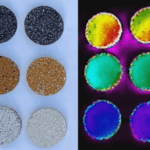
INVISITAGS: Integrated labels for the traceability of textile garments
October 7, 2025
RELUM: Innovative reflective pavements to reduce the urban heat island effect
October 13, 202509/10/2025
The Barcelona Innovative Transportation (BIT), the Research Center in Automotive and Advanced Mobility (CER-AMA) and The Future Mobility Research Hub (CARNET) research groups from the Universitat Politècnica de Catalunya - BarcelonaTech (UPC) are participating in the E-MED project, which aims to optimise energy and resource efficiency in public transport systems by addressing energy price fluctuations through smart and participatory solutions across the Mediterranean region.
The energy transition and energy price crisis have highlighted the urgent need to transform public transport towards more efficient and sustainable models. In this context—particularly relevant for the Euro-Mediterranean area—innovative solutions are needed to enhance both energy efficiency and the resilience of public transport systems.
To tackle these challenges, E-MED aims to strengthen the capacities of public transport operators and authorities through the testing and validation of advanced solutions that facilitate the transition towards a more efficient use of resources.
E-MED solutions seek to optimise energy efficiency, increase the use of renewable energy sources and improve the management of available resources. They combine technologies such as fleet and network planning tools, driver assistance systems, AI-based maintenance, and innovative practices such as battery reuse, rainwater harvesting, tyre efficiency maintenance, and sustainable procurement criteria.
This approach enables smart planning of public transport networks and operations, optimising charging systems, applying specialised technical expertise and promoting skills such as eco-driving. The strategy supports reduced energy consumption and extended lifetime of both fleets and infrastructures.
The E-MED methodology is based on participatory co-design involving stakeholders from the energy and mobility sectors, adapting strategies and action plans based on empirical evidence. The solutions are user-centred and provide guidance to both public procurers and the industry.
Impact
The project’s impact will be significant for a wide range of actors: local, regional and national authorities, public transport operators, service and energy providers, research centres, and citizens. The developed solutions are transferable and designed for real-world application, aiming to support evidence-based decision-making and foster a coordinated transition towards a more sustainable and circular collective transport model.
Specifically, the expected impacts include:
- Improved energy efficiency, reducing electricity consumption per kilometre travelled and generating direct operational savings.
- More efficient resource use, through battery and rainwater reuse and extended tyre and infrastructure lifetime.
- Enhanced decision-making support, via data-driven planning that allows for better investment guidance.
- Staff training, developing key skills such as eco-driving.
- Quantifiable impact (per company or partner), with estimated reductions in energy consumption between 10% and 30%, and improvements in the durability of key components between 15% and 25%.
- Value for procurers and industry, through tools and guidelines that support efficient strategic decision-making from design to service operation.
Consortium, Budget and Funding
The project brings together 10 partners from different fields, including public transport operators, local authorities, cities, and leading knowledge organisations in the energy and mobility sectors: Applus+ IDIADA, ATB Mobility, Carris, Centre for Research and Technology Hellas (CERTH), City of Maribor, Redmint, Transport Authority of Thessaloniki, TUSGSAL, and University of Maribor.
E-MED has a duration of 33 months (January 2024 – September 2026) and is co-funded with €2,382,723 through the Interreg Euro-MED programme.

Sector
Topic
You want to know more?
Related Projects
- A research team from the inLab FIB at the Universitat Politècnica de Catalunya - BarcelonaTech (UPC), together with the Asociación de Personas con Movilidad Reducida (AsoPMR), has taken part in the Spot4Dis project to enhance the mobility and autonomy of people with reduced mobility.
- The La Volta project foresees the construction of a large Catalan vault pergola within the Llars Mundet campus, in the Montbau neighbourhood (Horta-Guinardó district). This structure will become a new architectural landmark for Barcelona, combining traditional construction techniques with contemporary innovation. The project involves the Rehabilitation and Architectural Restoration Research Group (REARQ), at the Universitat Politècnica de Catalunya - BarcelonaTech (UPC), and is led by the Architects’ Association of Catalonia (COAC) and the Barcelona Provincial Council.
SATE-VEG: A system for energy renovation of buildings that helps reduce the urban heat island effect
Researchers from the Architecture, Energy and Environment (AiEM) group at the Universitat Politècnica de Catalunya - BarcelonaTech (UPC) have developed SATE-VEG, an external thermal insulation system with a vegetal coating that offers seasonally adaptive thermal behaviour, enhances urban biodiversity and promotes positive health effects. The system is made from organic materials, requires low maintenance and consumes minimal water.- A research team from the Interdisciplinary Group on Building Science and Technology (GICITED) at the Universitat Politècnica de Catalunya – BarcelonaTech (UPC) is leading the BioSAFE project, which aims to develop sustainable building envelopes —mainly façades— designed according to sustainability, comfort and safety criteria, with particular attention to their acoustic behaviour and fire performance.




